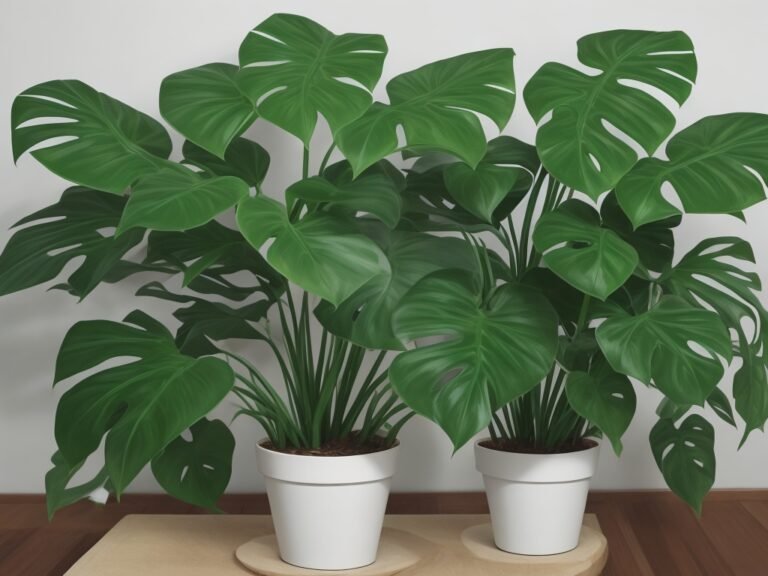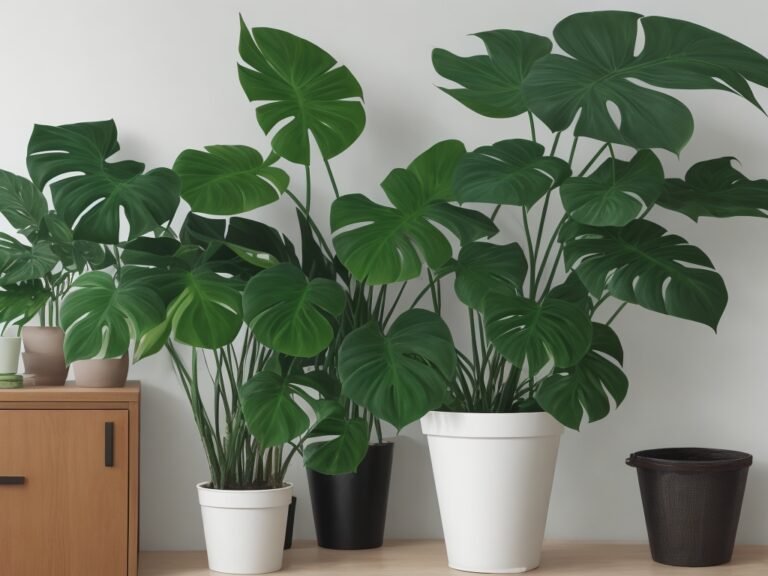What Temperature Range Do Monstera Plants Prefer?
Key Takeaways:
- Monstera plants thrive in temperatures between 65-85°F (18-29°C).
- Keep Monstera plants away from extreme hot or cold temperatures.
- Maintain a consistent temperature range for optimal growth and health of Monstera plants.
- Pay attention to temperature fluctuations as they can affect the overall well-being of Monstera plants.
Are you a plant lover trying to figure out the best temperature to keep your Monstera plants thriving?
Look no further! Understanding the ideal temperature range for these magnificent plants is essential for their growth and well-being.
In this article, I will dive into the importance of temperature for Monstera plants and the factors that influence their temperature preferences.
I’ll also discuss the optimal temperature range for indoor and outdoor Monstera plants, and the risks of temperature extremes.
Stay tuned for some valuable tips on how to maintain the right temperature to ensure your Monstera plants stay happy and healthy!
Understanding the ideal temperature for Monstera plants
Understanding the ideal temperature for Monstera plants is essential for their healthy growth and development.
Importance of temperature for plant growth
Temperature is crucial for plant growth as it affects various physiological processes. It influences seed germination, photosynthesis, and nutrient uptake.
Extreme temperatures can stress plants, leading to wilted leaves, stunted growth, and even death.
Maintaining optimal temperature range helps plants thrive and ensures healthy growth.
Factors affecting Monstera plant’s temperature preferences
Several factors can affect the temperature preferences of Monstera plants.
One important factor is the plant’s natural habitat, as Monstera plants originate from tropical regions with warm temperatures.
Another factor is the season, as these plants may have different temperature requirements during different times of the year.
Additionally, the age and health of the plant can also influence its temperature preferences.
Temperature fluctuations, both sudden and prolonged, can negatively impact the plant’s growth and overall health.
Proper temperature control is essential for the well-being of Monstera plants.

Optimal temperature range for Monstera plants
Monstera plants thrive best in temperatures between 65-80°F (18-27°C).
Ideal temperature range for indoor Monstera plants
Ideal temperature range for indoor Monstera plants
The ideal temperature range for indoor Monstera plants is between 65°F (18°C) and 85°F (29°C).
These tropical plants thrive in warm environments, so maintaining a consistent temperature within this range is important for their growth and health.
Avoid placing them near drafts or in areas with extreme temperature fluctuations.
Ideal temperature range for outdoor Monstera plants
For outdoor Monstera plants, the ideal temperature range is between 65°F and 85°F (18°C to 29°C). These tropical plants thrive in warm and humid conditions.
Providing them with temperatures within this range will help promote healthy growth and overall plant happiness.
Keep in mind that temperatures above 85°F (29°C) can lead to stress and potential damage, while temperatures below 65°F (18°C) can slow down growth and make the plant more susceptible to diseases. So, it’s crucial to monitor and maintain the right temperature for your outdoor Monstera plants.
Effects of temperature extremes on Monstera plants
Temperature extremes can have negative impacts on Monstera plants.
Both low and high temperatures can cause various problems for Monstera plants.
Risks of low temperatures on Monstera plants
Low temperatures can be risky for Monstera plants as they prefer warmer conditions. Exposure to cold temperatures can lead to stunted growth, wilting, leaf discoloration, and even plant death.
It is important to protect Monstera plants from freezing temperatures to ensure their health and well-being.

Risks of high temperatures on Monstera plants
High temperatures can pose risks to Monstera plants, affecting their overall health and growth.
Excessive heat can lead to wilting, leaf burn, and dehydration, causing leaves to turn brown, yellow, or dry out.
It can also impair the plant’s ability to absorb nutrients and photosynthesize.
Extreme heat can even cause irreversible damage and, in severe cases, lead to plant death.
It is crucial to provide adequate shade, proper ventilation, and regular watering to protect Monstera plants from high temperatures.

Tips for maintaining the right temperature for Monstera plants
Maintaining the right temperature for your Monstera plants is essential for their health and growth. Consider the ideal temperature range and ensure a consistent and stable environment for your plants.
Best practices for temperature control in indoor environments
Maintain indoor temperatures between 65-85°F (18-29°C). Avoid placing Monstera plants near drafts or HVAC vents.
Use a thermometer to monitor the temperature regularly.
Adjust room temperature as needed. Use a humidifier to maintain humidity levels of 50-60% for optimal growth.
Keep plants away from direct heat sources like radiators.
Shield plants from cold drafts or sudden temperature changes.
Strategies for protecting Monstera plants from extreme temperatures in outdoor settings
To protect Monstera plants from extreme temperatures in outdoor settings, there are a few strategies you can follow:
- Provide shade: Place your Monstera in a shaded area to protect it from direct sunlight during the hottest parts of the day.
- Use mulch: Apply a layer of organic mulch around the plant’s base to help maintain moisture and regulate soil temperature.
- Water wisely: Water your Monstera deeply and regularly, especially during hot weather, to keep the soil moist and prevent dehydration.
- Insulate during winter: If you live in a cold climate, consider insulating your Monstera by covering it with frost cloth or bringing it indoors during freezing temperatures.
- Monitor temperature changes: Keep an eye on temperature fluctuations and take action, such as moving the plant or providing extra protection, when temperatures become too extreme.
Remember, Monstera plants are native to tropical regions, so they prefer warm and humid conditions.
By implementing these strategies, you can help protect your Monstera from the harmful effects of extreme temperatures and promote its overall health and growth.
Frequently Asked Questions about Monstera plant temperature preferences
What temperature is too cold for Monstera plants?
Monstera plants are tropical plants that prefer temperatures between 65-75°F (18-24°C).
Temperatures below 50°F (10°C) can be too cold for Monstera plants and may cause damage to their leaves.
It’s important to keep them away from drafts or areas with cold air conditioning.
Can Monstera plants tolerate high temperatures?
Monstera plants can tolerate high temperatures, but they have limits.
It’s best to keep the temperature between 65-85°F (18-29°C) for optimal growth.
When the temperature exceeds 95°F (35°C), it can stress the plant and cause leaf damage.
Providing shade, proper ventilation, and avoiding direct sunlight can help protect Monstera plants from excessive heat.
Do temperature fluctuations affect Monstera plant health?
Temperature fluctuations can negatively impact the health of Monstera plants.
Sudden changes in temperature can stress the plant and weaken its immune system, making it more susceptible to diseases and pests.
It is important to provide consistent and stable temperatures for optimal growth and overall plant health.
Final Verdict
Understanding the ideal temperature for Monstera plants is crucial for their growth and health. Factors such as light intensity, humidity, and air circulation influence their temperature preferences.
For indoor Monstera plants, a temperature range of 70-85°F (21-29°C) is ideal, while outdoor plants thrive in temperatures around 65-85°F (18-29°C).
Extreme temperatures can be detrimental to Monstera plants, with low temperatures risking frost damage and high temperatures leading to leaf burn. To maintain the right temperature, it is essential to control indoor environments and implement strategies to protect outdoor plants.
Monitoring temperature fluctuations and providing adequate care will ensure the well-being of your Monstera plants.







